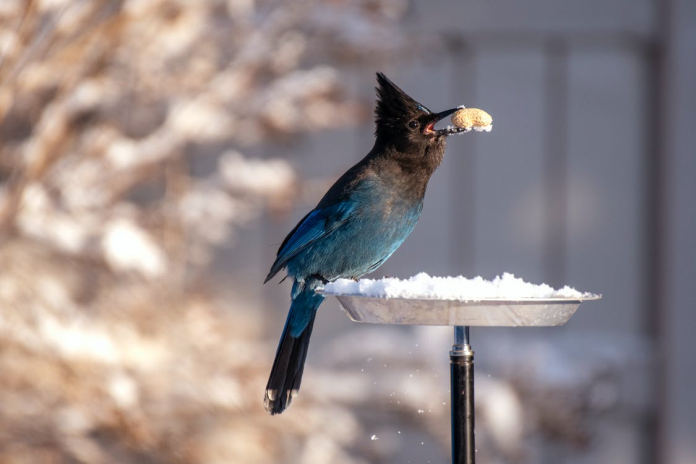As a senior, it’s important to try new things to exercise both your physical and mental health. Studies have shown that spending a substantial amount of time outdoors observing nature has multiple proven health benefits.
Birdwatching is a form of wildlife observation; it is the act of discovering, distinguishing, and identifying different bird species.
What other hobbies would be better than one that makes you active, young at heart, and appreciate even the smallest things in life? Besides, it’s better to soak in nature instead of the internet or other devices.
Not to mention that out of 17 million people who bird watch, 7.7 million of them are seniors!
Bird watching puts you into a meditative state where you are relaxed, inspired, and with a clear focused perspective. And because of that, we don’t even realize that we are exercising our memory, cardiovascular system, and even the brain itself.
Mentally, it can help you lower your stress levels and reduce the chances of mental illnesses such as anxiety and depression.
Birdwatching outside will let the morning sun improve your bone health with Vitamin D and the fresh air boost your mood and calm your nerves.
If you’re interested in bird watching, you can check out Birding Hub for more information and the best birding guides. And if you’ve finally decided to bird watch, here are some of the most essential bird watching gear:
Binoculars
Binoculars are extremely useful in birdwatching. A bad or uncomfortable pair can make you bored and discouraged. Binoculars are powerful, without them, a beautiful bird may seem like just a speck of color. And since we can’t approach the birds because they are easily startled, binoculars help you bring the birds closer.
A pair with magnification can easily improve your eyesight without straining it. Magnification can make the colors remarkably bright and in high quality. When it comes to lenses, it’s important to choose one that is comfortable and with a wide field of view. This can rest easily against your eyes and give you a wider and clearer view of the birds.
Usually, binoculars cost $100 dollars, but the price can increase to $500 or more if you choose one that has a lot of features and will last for years.
Field Guide
Watching birds through your binoculars may be fun, but having the skill and ability to identify them can give you high satisfaction and a better experience. A field guide can help you classify and learn about birds.
A great field guide would be one that has a page for every species in your area. It should also contain a helpful map, a lot of guides, and identification tips.
The most important thing to consider when buying a field guide is whether it is tailored for the area you’ll be birdwatching in.
Bird Feeders
Sometimes, our locations are far from their natural habitats. So if you don’t want to go to where the birds are, you can bring the birds to you by using a bird feeder.
Using this, you can attract multiple birds and feed them at the same time. With the right seeds, you can even attract a specific bird.
It is best to buy one that is squirrel proof. You may be surprised when you end up feeding your neighborhood squirrels instead of the birds.
Never forget to clean your bird feeder to avoid the spread of bird diseases.
Bird Seed and Other Food
Buying bird food from credible sources can ensure that what you feed the birds is both safe and can provide them the required energy levels.
Your seed and food choice can either attract and ward off a species. So you can either choose one that attracts most species or buy a specific one depending on what you want to attract.
When it comes to food, avoid feeding them desiccated coconuts, sugary treats, and oats. Also, if you’re feeding them breadcrumbs, remember that they should be soaked, not stale.
A Birdbath
Aside from a bird feeder, you can also attract them to your backyard using a birdbath that will help them complete their daily routine. Birdbaths help birds wash down their dry meals and bathe.
You should also regularly clean your birdbath to avoid moss and make sure that it doesn’t freeze over in winter. If you’ll be defrosting your birdbath, never use salt because it is extremely harmful to them. You can even find a heated bird bath like one of these for next winter to make things even easier for you.
A Journal
It can be fun to have a birding journal where you can jot down notes about a bird you saw and staple photos of it. Besides, a journal can be your personal reference and it would be fun to see that journal again in a few years to enjoy the memory.
If you want to observe birds for as long as you can, jot your observations on a journal, so when you get home, so you can take your time in differentiating them with the birds in your field guide.
Outdoor Gear
Protection
Although the sun is good for your bones, you should still protect yourself from it.
A hat is good for keeping the sun away from your eyes for a clearer undisturbed view. While sunscreen is important to avoid sunburn and other skin conditions caused by a long soak in the sun.
A bug spray is important too but always make sure that the one you’ll be using is environmentally safe.
Comfortable and Durable Footwear
When approaching their natural habitat, you may encounter a muddy path, or worse, a swamp. And that’s why footwear that helps your feet breathe and protects them is essential.
Daypack
A bag or vest that can carry your field guide, hat, sunscreen, insect spray, water, light snacks, and medications is perfect for your birdwatching trip to avoid any difficulties.
Proper Clothing
Avoid wearing bright-colored clothes as they attract attention. It’s better to be wearing natural colors as camouflage to not startle the birds.
























